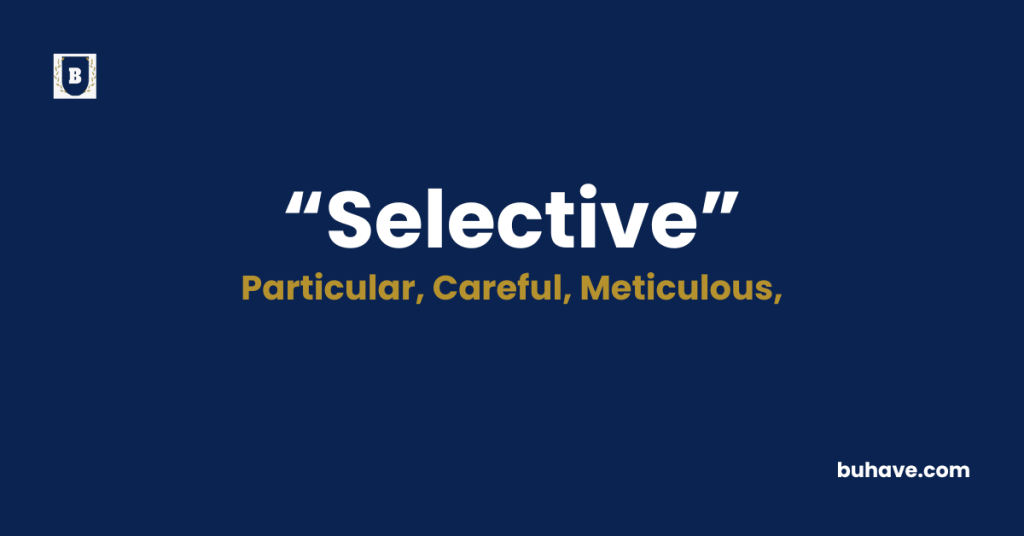The word Selective (Adjective) refers to the act of choosing carefully from among a variety of options, often based on specific criteria. In this guide, you’ll learn the full definition, synonyms, antonyms, etymology, and real-life examples of how to use Selective correctly in sentences.
Selective Explained in Depth
A complete and detailed guide to the word Selective including meaning, definition, examples, etymology, synonyms, and antonyms.
Meanings of Selective
Selective means showing careful choice or preference by including only certain people, items, or ideas and excluding others based on specific standards or purposes.
Definition
Selective describes an approach, person, or system that chooses with intention and care, often using specific criteria to include some options while rejecting others. It can apply to various settings, such as education, hiring, friendships, memory, or shopping. For instance, a selective school accepts only applicants who meet strict qualifications. People can be selective in their taste in music or food, indicating refined or specific preferences. In biology or technology, “selective” may relate to filters, responses, or mechanisms that act only on certain inputs.
Although selectiveness can be seen as discerning, it may sometimes imply exclusivity or unfair exclusion, depending on context. The word emphasizes attention to detail, precision, and intentional limitation.
Etymology
The word “selective” originates from the Latin verb seligere, meaning “to choose” or “to pick out,” which combines se- (apart) and legere (to gather). It entered English in the early 19th century as a derivative of “select,” initially describing biological processes or deliberate choices in design. Over time, “selective” expanded to describe mental, academic, and personal choices. The term became common in education, hiring, and science,
where only particular characteristics or qualifications matter. In modern usage, it may suggest discernment, quality control, or preference. However, it also requires sensitivity when applied in social or institutional contexts to avoid bias or exclusion.
Example Sentences
- She is very selective about the books she reads.
- The university has a highly selective admissions process.
- Selective attention helps people focus on what’s most important in a busy environment.
Selective Synonyms
- Discerning
- Particular
- Judicious
- Exclusive
- Discriminating
- Specific
- Deliberate
- Critical
- Careful
- Precise
Selective Antonyms
- Indiscriminate
- Random
- Unselective
- Open
- Careless
- General
- Inclusive
- Haphazard
- Noncritical
- Undiscerning
FAQs about Selective
Here’s a FAQ-style guide about the word “Selective”
1. What does selective mean in education?
It refers to schools or programs that admit only certain students based on academic or other criteria.
2. Can being selective be a good thing?
Yes. Being selective often reflects discernment, intention, and quality control.
3. Is being too selective a disadvantage?
In some situations, it may limit opportunities or lead to missed experiences.
4. What is selective memory?
It refers to the tendency to remember only certain details, often subconsciously.
5. How is selectivity different from discrimination?
Selectivity focuses on criteria and purpose, while discrimination often involves unfair bias or exclusion.

















